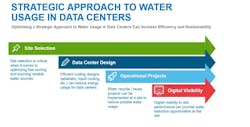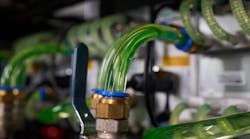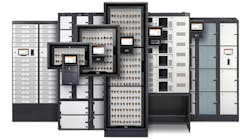High-Performance Computing Elevates Need for Smart Water Management in Data Center Cooling
Today’s exponential increases in computing loads bring proportional increases in power and cooling demand. This makes efficient resource management not just an environmental issue but an organizational imperative. Resource scarcity is already disrupting expansion plans, increasing operational costs and threatening business continuity.
When evaluating any cooling method, data centers need to take a holistic approach to consider the direct and indirect impact of energy and other resources both on and off premise. Organizations need high-quality, efficient solutions at scale so that when workloads evolve, their cooling infrastructure can adapt accordingly.
Why water?
One common misconception is that the best way to reduce an organization’s water footprint is to simply not use water on premise for cooling infrastructure. In some regions and geographies, without more in-depth analysis, this approach may cause a facility to generate larger hydro and power footprints, based solely on the thermodynamics of water itself.
Water can remove more than 3,200 times as much heat as air. Depending on geography, climate and workload, air-cooled, waterless chillers can consume anywhere from 10–30% more power than their water-based counterparts. Think about taking your glove off when it’s freezing outside versus plunging your hand in ice water or jumping into a swimming pool when it’s hot outside versus sitting in front of a fan. In both cases, the water cools faster and more effectively.
Industry challenges
Answering the questions as to whether and when to leverage water as part of data center cooling infrastructure is not as straightforward as it would appear on the surface. However, data centers providers don’t have to go it alone. Collaboration with a cooling- and water-management expert can help data centers understand the complexity of their cooling systems and adapt to rapidly changing demands with confidence, enabling site staff to maintain focus on uptime and daily operations.
Whether a cooling system is being designed for greenfield or brownfield developments, a strategic approach to prudent use of alternative water sources in data centers can produce large gains in operational and environmental efficiency (see Figure 1 below).
Effective cooling solutions require deployment of cutting-edge real-time monitoring technologies, fluid management programs and local service expertise at global scale to help operators maximize cooling efficiency while minimizing impact. As an example, Ecolab’s current portfolio offers a variety of digital innovations to deliver data and actionable performance and operational insights in real time, such as:
- Ecolab Water Quality IQ
- 3D TRASAR Technology for Cooling Water
- 3D TRASAR Technology for Adiabatic Cooling
- Ecolab Water Track IQ
Critically, these digital tools deliver enterprise visibility to operational performance across a provider’s portfolio to help establish benchmarks as well as identify and scale best practices and continuous improvement.
Optimization at work
Using this approach, we recently piloted an AI-driven water conservation solution with Digital Realty in 35 of their U.S. data centers to help identify real-time operational inefficiencies in cooling systems and recommend actions for fast improvement. Once fully implemented, the solution is expected to drive up to a 15% reduction in water use, extend the life of equipment and avoid the withdrawal of up to 126 million gallons of potable water from local watersheds annually.
Time and again, we have demonstrated that prioritizing the health of businesses and planet don’t have to be mutually exclusive. With the right expertise, it is possible to design and manage cooling systems that are both good for planet and good for business. At Ecolab, we are proud to support this progress and remain committed to helping the data center industry harness the full potential of cooling and the technology it supports.
Visit the Ecolab website to learn more about our innovative data center cooling solutions.
About the Author

Michael Obradovitch
Michael Obradovitch, Esq., Area Vice President of Global Accounts for Ecolab’s data center industry segment, brings over 20 years of experience in engineering, law, and global account leadership, helping data center clients implement scalable water treatment, liquid cooling, and sustainability strategies that deliver measurable ROI.
A global leader in water and process management solutions, Nalco Water, an Ecolab company, works with customers across a wide range of industries to help them address their business goals.




